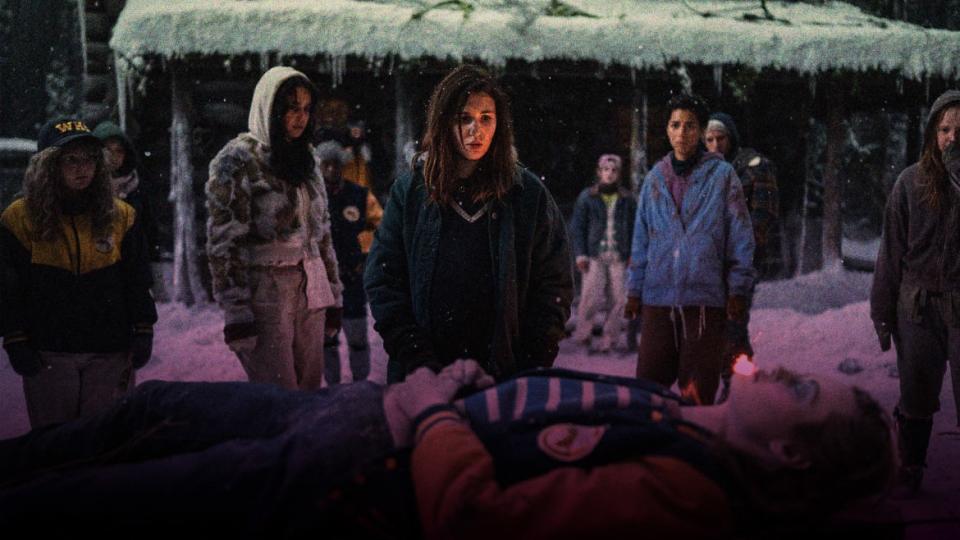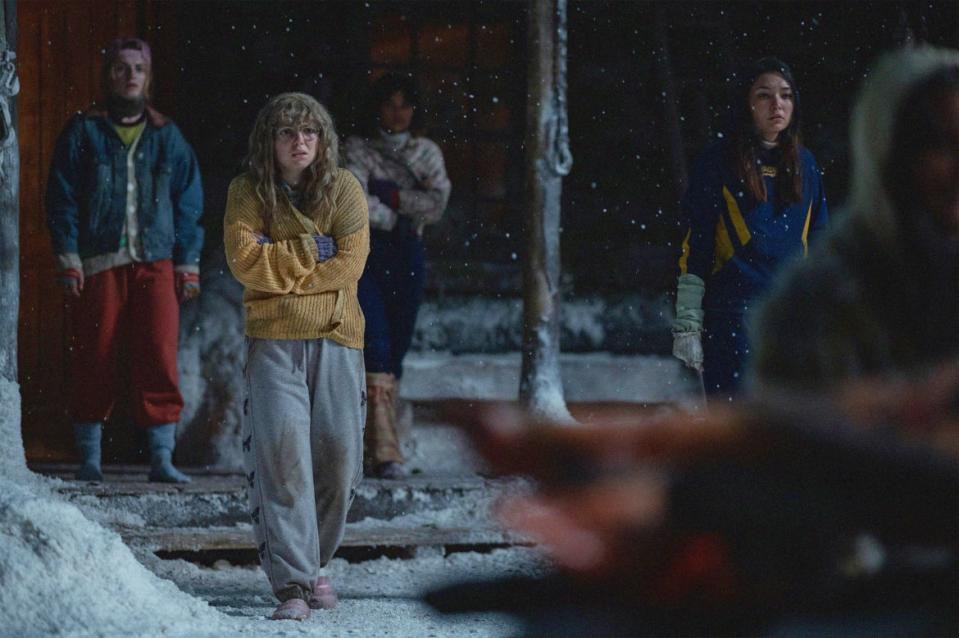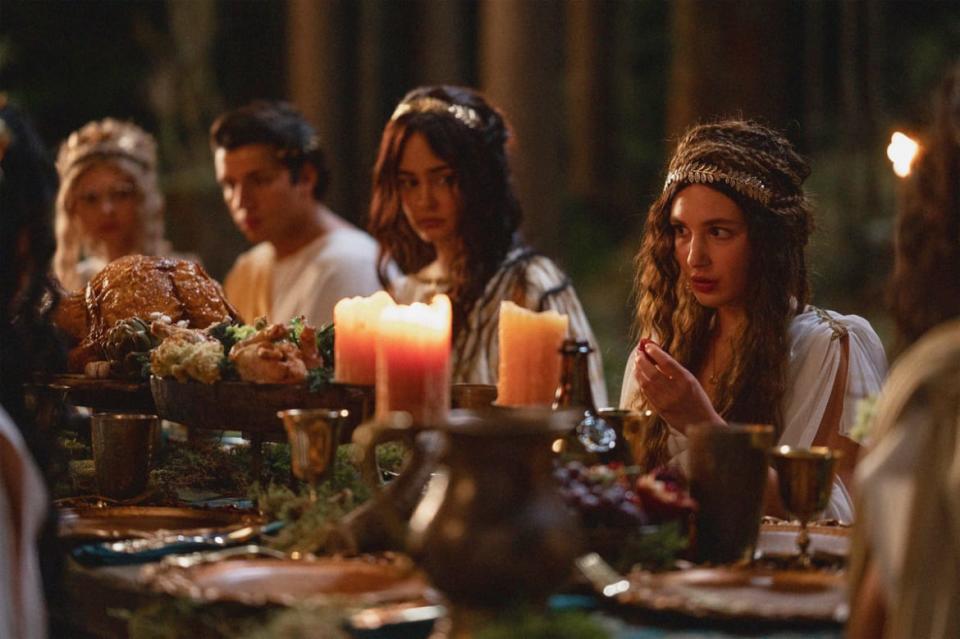The Duo Behind Yellowjackets’ Haunting Score Know All the Secrets, but They Won’t Spill

Admit it: The spooky breaths, feral cheers, raspy whispers, and garbled yells that comprise the score of Showtime’s smash hit Yellowjackets have gotten under your skin. It’s possibly the only music on TV that doesn’t sound like music at all.
Though Theodore Shapiro composed the score for the pilot, he was unavailable once the series was greenlit. Enter Craig Wedren and Anna Waronker, who admired Shapiro’s work—but also called it “a perfectly set table that [we] wanted to tip over.” To their immense delight, the nastier their vision became, the more the producers loved it. As a result, this intense tale of teenagers surviving the impossible and their adult counterparts navigating the trauma they carry with them still is all backed by thumping percussion, deep breaths, and that killer (pun unintended) Farfisa organ.
The Daily Beast’s Obsessed recently sat down with Waronker and Wedren to discuss the show’s “rock opera”-like theme song, the embarrassing technical glitch that actually became a godsend, and if working on Yellowjackets has made their children finally think they’re cool.
The score sets so much of Yellowjackets’ tone, but you don’t work on it episode by episode. How do you maintain sonic continuity, while jumping around in the story?
Anna Waronker: We jumped in on episode two [of Season 1] for the rest of the series. We did episode six, and so much happened in that episode. For episodes three, four, and five, we had to fill out a hole from the setup for episode six. So it actually really helped us in that way [to work on the show in a non-linear fashion].
Craig Wedren: It’s almost like we got to answer the questions that we would have had to have asked and connected with. So many things were solved in episode six musically, thematically, and sonically.
In an interview, Craig, you said the trauma of the last few years drove you toward watching horror movies. The same is true for me: I used to avoid horror movies like the plague, but now I’m like, “What a lovely reprieve!”
Wedren: [The pandemic] just turned [horror movies] into like a fun cartoon. You’re like, “Ooh, you get to have all of those feelings in a safe space.” It’s like a roller coaster. It’s why we call them thrill rides.
Waronker: I’m not there yet. I still haven’t embraced the genre. I just love the show. I embrace darkness. That I really understand. It’s the scary jump stuff that’s not generally my jam. But especially in this upcoming season—which of course, we can’t talk about too much.
The Showtime snipers are in position. [laughs]
Wedren: We got the most amazing list a couple hours ago [of embargoed plot details]. We were like, “Oh, OK!”
Waronker: But I wouldn’t do that anyway. It’s deep, and there’s so many layers and everything is so guttural. So that stuff I really can dig into. But the leg, a plane going down, I don’t want to know.
‘Yellowjackets’ Season 2: The Biggest Fan Theories Ranked by Plausibility
When you’re listening back to what you’ve composed and weaving together different tracks, how do you know when to stop, subtract, or add to your work?
Wedren: It’s largely intuitive [to understand] when there’s a magic moment, when an element or a series of elements synergistically enhance each other—the rhythm of the dialogue, the interaction of the characters, the overall story arc, what’s happening on screen.
Some of my favorite cues that we’ve written for the show, I listen to them out of context… and I’m like, “Is this even music?” Then I watch it in the scene, and everything is enhancing the story and the relationships. When that happens, it’s gold. That doesn’t always happen, of course, but that’s the gift that sometimes occurs.
Waronker: I think of us like a band almost, because this is so creative. This isn’t like your regular show, where you just [do the score]. This is very intense. We’re each other’s editor, and we are constantly bouncing things off of each other, which is helpful, because sometimes it’s hard to see the forest through the trees.
The other thing is that for this season, we did a lot of stuff ahead of time. We wrote all of these pieces based on some previous score themes, that we’ve evolved into something else, and then some new stuff. Watching how that unfolded with the new material when it worked was so exciting. We were tapping into something without knowing anything that was gonna happen.
I read about a mishap you had, where you sent the score for the baptism/abortion scene in Season 1, episode six, to the producers, but there was a technical glitch, so all they heard was five minutes of breathing. Still, they sent you detailed notes, and you were like, “No no, that’s the wrong version!“
Wedren: [laughs] Yeah, they were like, “OK, we can roll with this.”
Waronker: You know what’s cool about that, even though it was kind of horrifying to us as professionals? The trust was very earned right there between us and them, because they gave it so much time when they didn’t have [a lot of time]. [The version they got] was really way too arty even for us. We’re going as weird as we can do on the show, and they just wanted more weird. Then they loved what we sent them, when they got all the files. So that was actually a really good moment, because it really opened it up for us.
It sounds like you’ve tapped into the internal mythology of the show through the score, despite that aspect of the story being opaque to the audience.
Wedren: It really is like a possession [to work on Yellowjackets]. There was a moment where I was like, “OK, don’t even try to organize a balanced life around this. Just surrender to it.”

Jenna Burgess as Teen Melissa, Samantha Hanratty as Teen Misty, Nuha Jes Izman as Teen Crystal and Alexa Barajas as Teen Mari in Yellowjackets.
In a prior interview, you both talked about your own sons, who of course act unimpressed by what you do. But now they see the streams of the show’s soundtrack on Spotify and people obsessing over it online. Have your kids finally started thinking you’re cool for working on this show?
Waronker: I mean, there is a billboard on the way to school every day that we have to pass.
Wedren: I actually really trust my son’s ear on things. A lot of times I’m like, “Come listen to this.” He’ll usually give me good feedback when Anna’s not here. I don’t know if any of his friends are Yellowjackets fans.
Waronker: [My son] has friends that are into it. One day he called me from school and he’s like, “When does Yellowjackets come out?” Meanwhile, if I’m like, “Hey, can you listen to something?” He’s like, “Nope. No, I don’t want to see it.” He even had a nightmare [about] the day I asked him to listen to something and he didn’t listen to it.
Wedren: I think [my son] just started watching Yellowjackets. It’s not really his thing. I don’t know that it’s going to be his thing. We’ll see. [The show has] a lot to keep track of.
Waronker: If we didn’t have to watch it, like, 100 times, I would not know half the things that are going on.
Wedren: We’re watching the scenes 50-60 times. We’re working on a cue, and we keep discovering things. This season, interestingly, more than last season, I felt like—I don’t know if this is true or not—the storytelling is so dense. I’m finding, with certain scenes, we’re having to be almost Pointillist about really marking the moments and making sure that the storytelling is clear, because so many layers of things happen so fast. It’s really fun. It’s like another big skill builder.
Waronker: It really is more like a rock opera.
The Wild ‘Yellowjackets’ Premiere: The Story Behind That Hilarious Papa Roach Moment
That’s why the theme song has caught on like wildfire. It sums up the show’s ’90s teenage angst perfectly, while still incorporating the supernatural. I think it’s owed to both the use of the Farfisa organ and the haunting vocals. How did you decide what the vocals should be like?
Wedren: It was purely organic, like an instinctual [idea], like so much of the score. It started with [original composter Teddy Shapiro] working with [singer] Caroline Shaw. And then we just kept adding to it, because we’re both singers… It’s rare to work on something that can support vocals. Because so often the human voice gets in the way of dialogue and you don’t know what to listen to. As people we gravitate toward other human voices. If there are too many, sometimes it doesn’t work. For some reason, in the show, it totally works.
Waronker: I think it was [executive producer and pilot director] Karyn [Kusama], right, who was saying that she wanted the voices to be the voice of the wilderness?
In the new season, a lot [of the new pieces we wrote] are based on themes from the first season, but we completely reimagine them vocally. We even brought Caroline Shaw in for a session.
I would think when you bring her into a session, you would have these big orchestral vocals ready for her to do, and instead it was just her groaning and her phlegm. She had the best time because we’d already kind of done all of these vocal orchestras. So we just had her do just whatever she felt like.

Samantha Hanratty as Teen Misty, Kevin Alves as Teen Travis, Courtney Eaton as Teen Lottie and Sophie Nélisse as Teen Shauna in Yellowjackets.
Did either of you have anything to do with Florence Welch’s cover of “Just a Girl,” which she teased in a tweet ahead of the season?
Wedren: No! I mean, we do handle her Twitter account. [laughs]
She tweeted a clip of her going through a rack of these beautiful diaphanous gowns. And then she chose a Yellowjackets letterman jacket and put it on.
Wedren: Oh, that’s so rad! That’s awesome!
Waronker: We don’t know a thing about that. But we know things about other things that we can’t say. [laughs]
Wedren: There are other special guest voices this season.
So happy I got picked for the team this year 🩸 @yellowjackets96 pic.twitter.com/LyNL3w5QRm
— florence welch (@florencemachine) March 6, 2023
Craig, you said in an interview that composer Nicholas Britell [of Succession] made theme songs hip again. His title credits are another no-skip track for me.
Wedren: Theme songs were my favorite things to do when I first started doing TV, and then they just went awry. I was like, “What about my secret career as a jingle guy?”
Waronker: That’s all I wanted. I still want it.
They’re universal. You could live in any part of the world and still know the words to the themes from Happy Days or Fresh Prince.
Wedren: Totally. There’s something about the brevity of a theme song that’s kind of hardcore punk, where you’re fitting an entire song, with an enormous amount of information and energy, into an extremely short, sharp statement. And I appreciate that.
The music in the show itself can be totally different in tone from the theme song. When Travis and Natalie are trying to have sex, or when Taissa and Shauna are speaking in the diner, the score feels more minimalist, because those are universal human experiences. What was your process for those scenes?
Waronker: I started [composing the score for Natalie and Travis], and then played it for you. But then you loved it, and that meant that it worked.
Wedren: Then I added some guitar, and then we had a teen love theme. It just felt like being a teenager in love with all the melancholy and the falling [in love]. That theme in particular felt like a band we would both have wanted to be in.
Waronker: That’s the thing with this show. There’s an entire world of emotions that are going on at all times. Things like [these quieter scenes] are a nice relief, actually.
Wedren: The really crazy stuff is really fun. It’s just that on a practical level, it’s a giant pain in the ass, because the sessions are so big, and you’re scrolling through, trying to find things. Given our druthers, we’d like to keep it real tight, you know? 10 tracks or less. But I mean, there are literally 100 [tracks for some of them].
I know you’re not allowed to talk about anything. But is there a moment, in the vaguest possible terms, that you can’t wait for people to see?
Wedren: There have been a few cues this season, which are like, “Whoa.” It’s a thing that happens where you’re working on it, and suddenly it comes together, and you’re surprised. You don’t necessarily feel like the authors of it, it just sort of reveals itself to you. And it’s like, “OK, don’t touch it! Just leave it!”
Then there are also some really, really fun… [pieces] on the simpler side, the less dense side of cues, just like good, almost old fashioned, but weirdo in the Yellowjackets way.
Waronker: [The younger cast is] getting a lot of the crazy, crazy music that we’ve written and then the adults… are getting some really fun [cues].
I think it’s impossible to be alive and make art and not be affected by the last few years. Has the pandemic changed your view of what you do or your artistic expression? Has it altered the way you go about your work?
Wedren: I think, energetically, it shows up. But on a conscious level, and in terms of routine, [the pandemic] really didn’t change much. Because our studios are in our backyard, we live in the same neighborhood.
Waronker: That was also nice, because we got to be around each other because we’ve worked through the whole pandemic together. We were in a little bit of a bubble. For me, it kind of opened up, because we didn’t have to go anywhere. I was able to work around the clock. That kind of shifted my energy about how to do this job.
Before, because I’m a mom, I’d have to have more rigid boundaries … I gotta take them to school or whatever. And [the pandemic] really opened that up. I am having a hard time adjusting now that life is getting back to normal.
Wedren: I also think that the pandemic cracked everybody open to allow for something like this show… The music and the show and the energy of it is so shape-shifting. That feels pretty new. And I think it speaks to sort of where we’ve all recently been.
Waronker: I hadn’t thought about that because they’re trapped, like the entire world was. [We were all] trying to figure out how to survive with, in my opinion, evil forces from above coming down on us, which was our former president. [We saw] that there was an after to the current state… Maybe that’s part of the reason why [Yellowjackets is] appealing. It’s identifying the struggle that we’ve all been going through, and then the fact that there is going to be life afterward.
I’m not sure how receptive mainstream viewers would have been to something so, by TV standards, experimental, had it not been for COVID-19.
Wedren: Yeah. It’s something to obsess over, to wonder about, to puzzle over, in that Twin Peaks-y way.
Waronker: Oh, man, is it gonna be fun for you.
Get the Daily Beast's biggest scoops and scandals delivered right to your inbox. Sign up now.
Stay informed and gain unlimited access to the Daily Beast's unmatched reporting. Subscribe now.

 Yahoo Movies
Yahoo Movies 